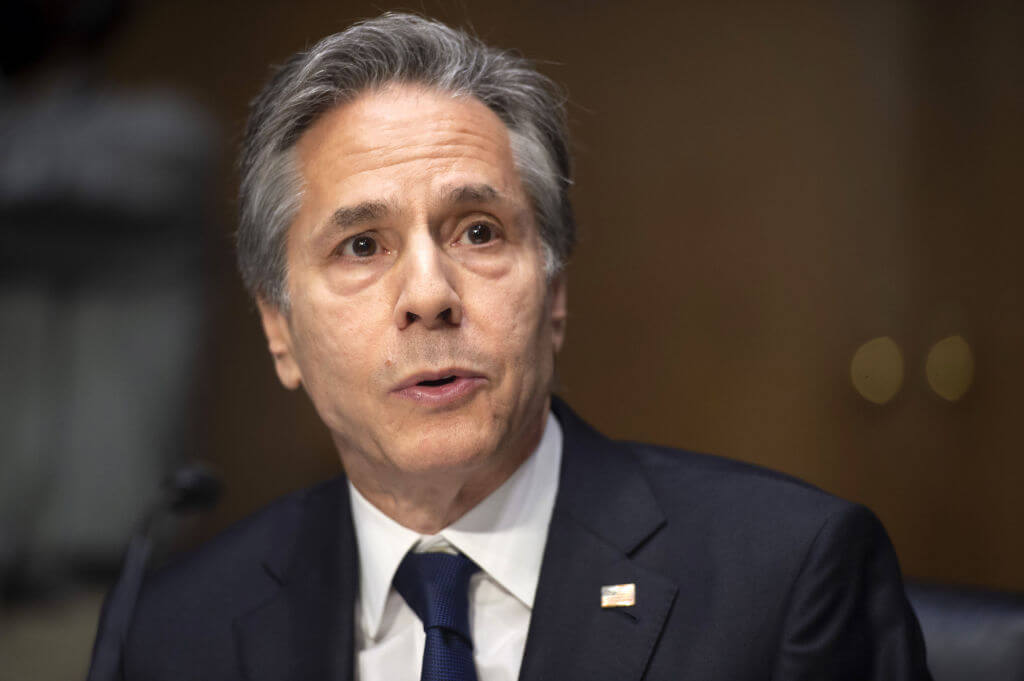Blinken: A nuclear deal with Iran is our best option
The secretary of state’s remarks follow recent reports that a deal is unlikely to be made

Antony Blinken, U.S. secretary of state, speaks during a Senate Foreign Relations Committee hearing in Washington, D.C., U.S., on Tuesday, April 26, 2022. Photo by Bonnie Cash/UPI/Bloomberg via Getty Images
Secretary of State Anthony Blinken said during a hearing in Congress on Tuesday that the Biden administration still sees the resurrection of the 2015 nuclear deal with Iran, “whatever the imperfections are,” as the best way to stop Tehran’s rush toward a bomb. Israeli officials have reportedly said the chances of a renewed nuclear deal with Iran in the coming weeks are “slim to none,” and Axios reported that the White House has started considering other alternatives.
In a hearing before the Senate’s Foreign Relations Committee, Blinken maintained that pushing back Iran’s capabilities to produce a nuclear bomb, even though the U.S. had not been able to closely monitor all its nuclear activities, had already proved more successful than the alternative tried by the administration of former President Donald Trump. He pulled out of the 2015 deal and instead tried to pressure the Iranians to cease their nuclear programs. Blinken cited “many Israeli colleagues from the security establishment who have come out and said publicly that it was a huge mistake to pull out of the agreement” in 2018.
Abandoning the agreement has meant that Iran’s nuclear program, “had pushed back the breakout time to a year in terms of being able to produce fissile material for a weapon, that’s come down to a matter of weeks,” Blinken said.
Year-long indirect talks between the U.S and its allies with Iran in Vienna have reached a stalemate in recent weeks over Iran’s insistence to remove the Islamic Revolutionary Guard Corps from the State Department’s Foreign Terrorist Organization list.
David Ignatius of the Washington Post recently reported that Biden is said to have rejected Iran’s demand, acquiescing to calls from Congress and Israel. Israeli Prime Minister Naftali Bennett raised the issue in his last phone call with Biden on Sunday, but no public commitment has been made by the White House.
Blinken didn’t reveal the official U.S. position on the Guard Corps but noted that Iranian attacks on U.S. forces in the Middle East increased 400% after the U.S. withdrawal from the nuclear deal and Iranian military forces and proxies in the region have seen “sustained support” even when economic pressure on the regime was highest. “It’s an unfortunate fact of life that Iran is willing to dedicate what resources it has to supporting its military, to supporting its various tools – the destabilization and terror, including the IRGC Quds Force – irrespective of what its revenues are from other sources,” he said.
The official Israeli position is against a new deal, with leaders of both the government and the opposition describing it as “shorter and weaker” than the 2015 agreement, though some Israeli intelligence officials support the U.S. approach. More than a dozen Democratic members of Congress have spoken out against a potential agreement in which Iran accepts limitations on its nuclear program in exchange for sanctions relief.
The Iranian parliament set its conditions earlier this month, among them written guarantees that the U.S. would not quit the deal again.
“We are not there,” Blinken said on Tuesday regarding a new deal with Iran.




















